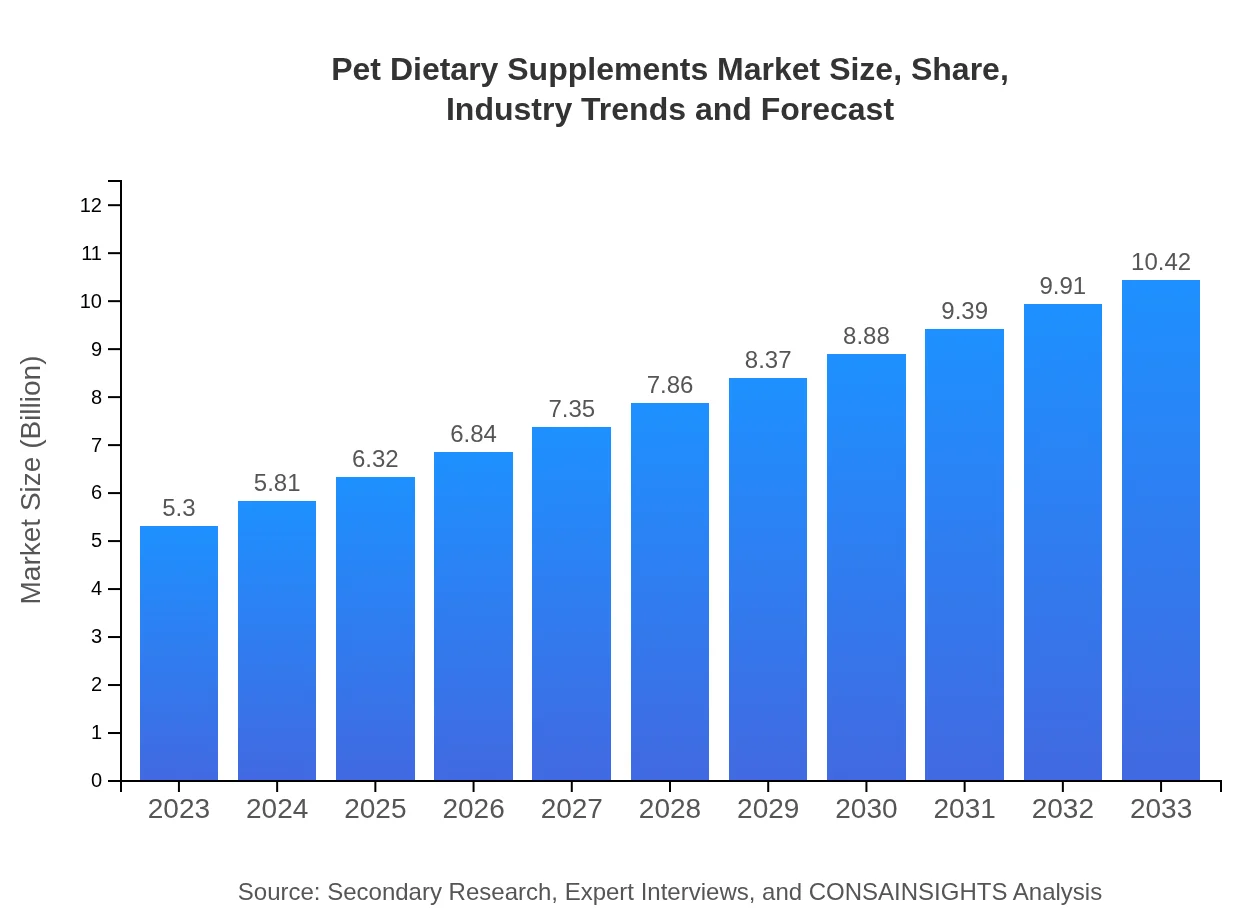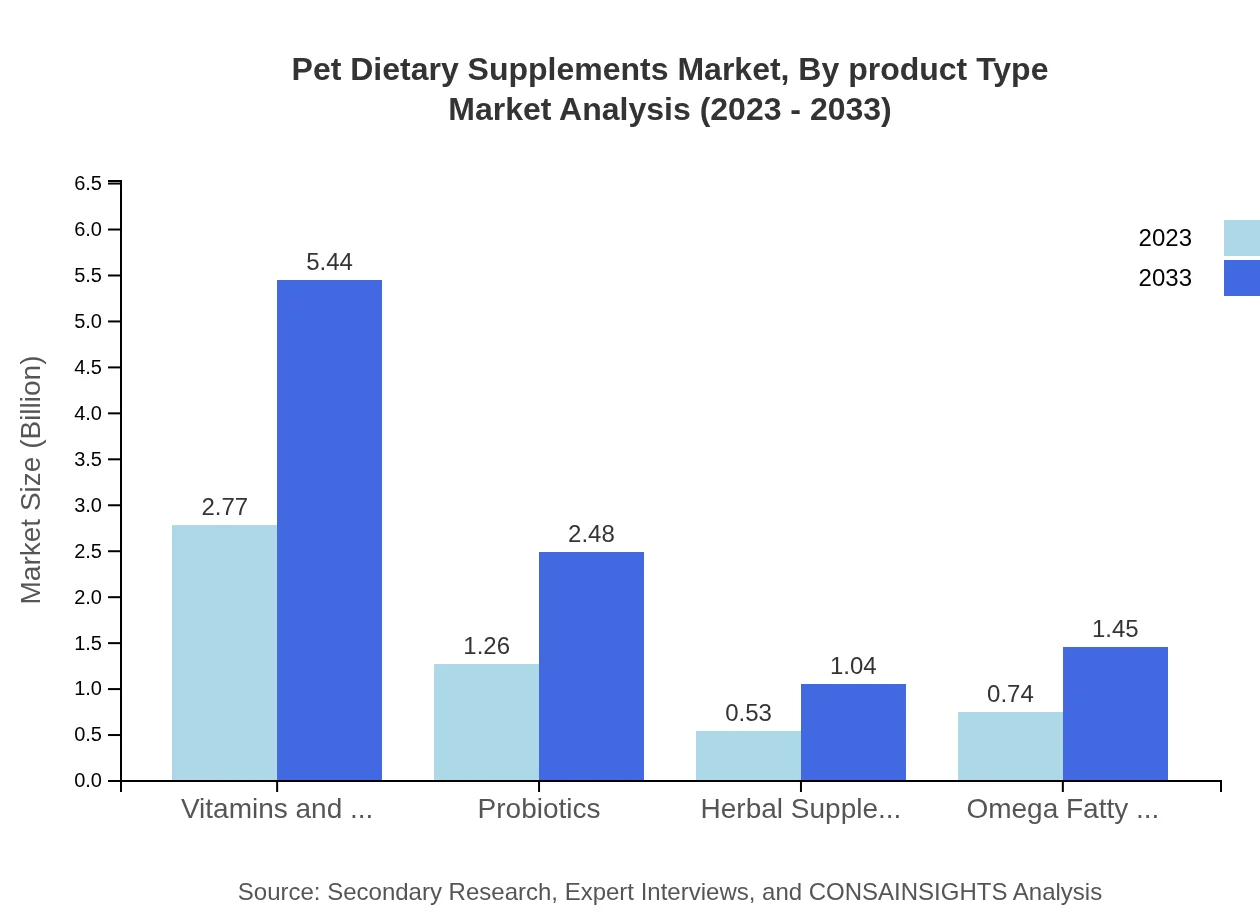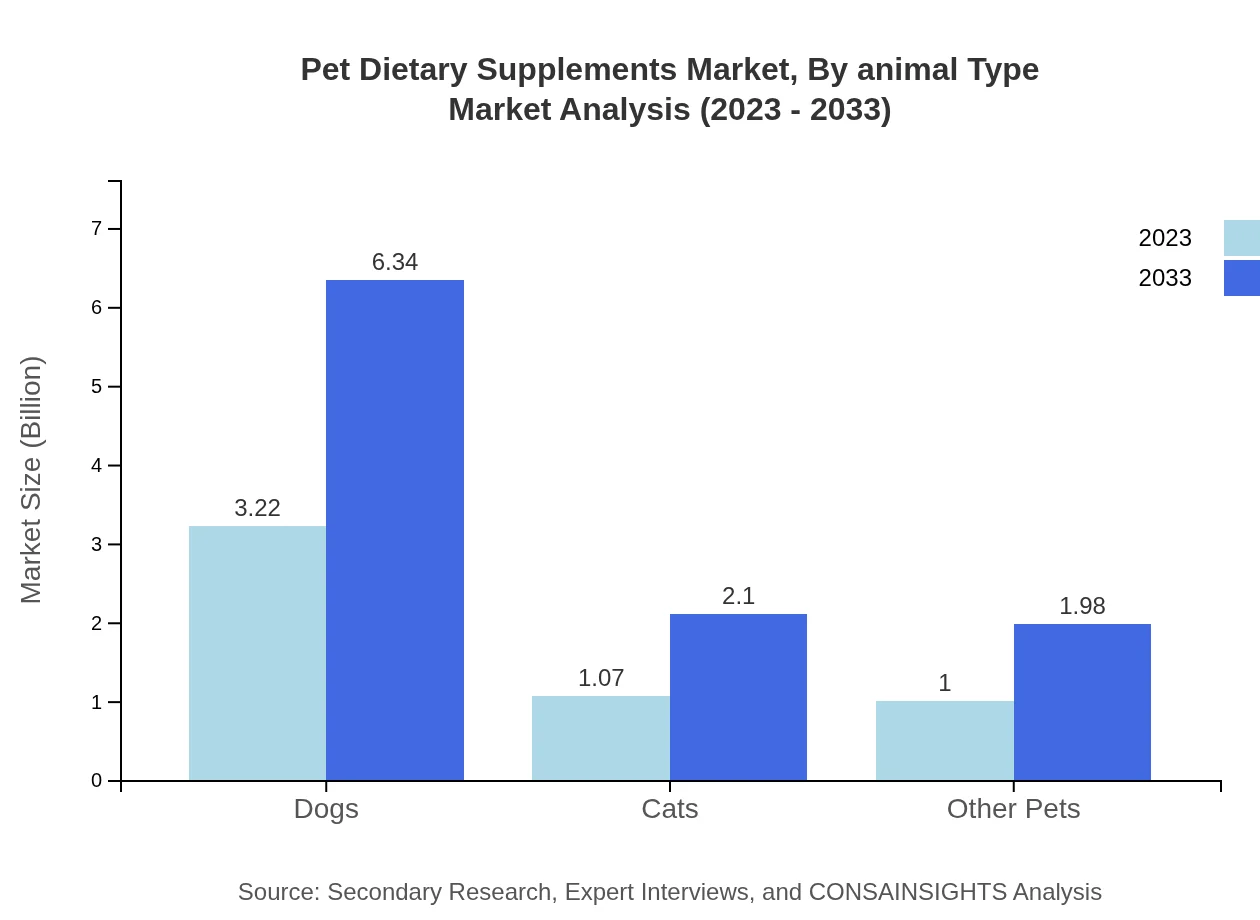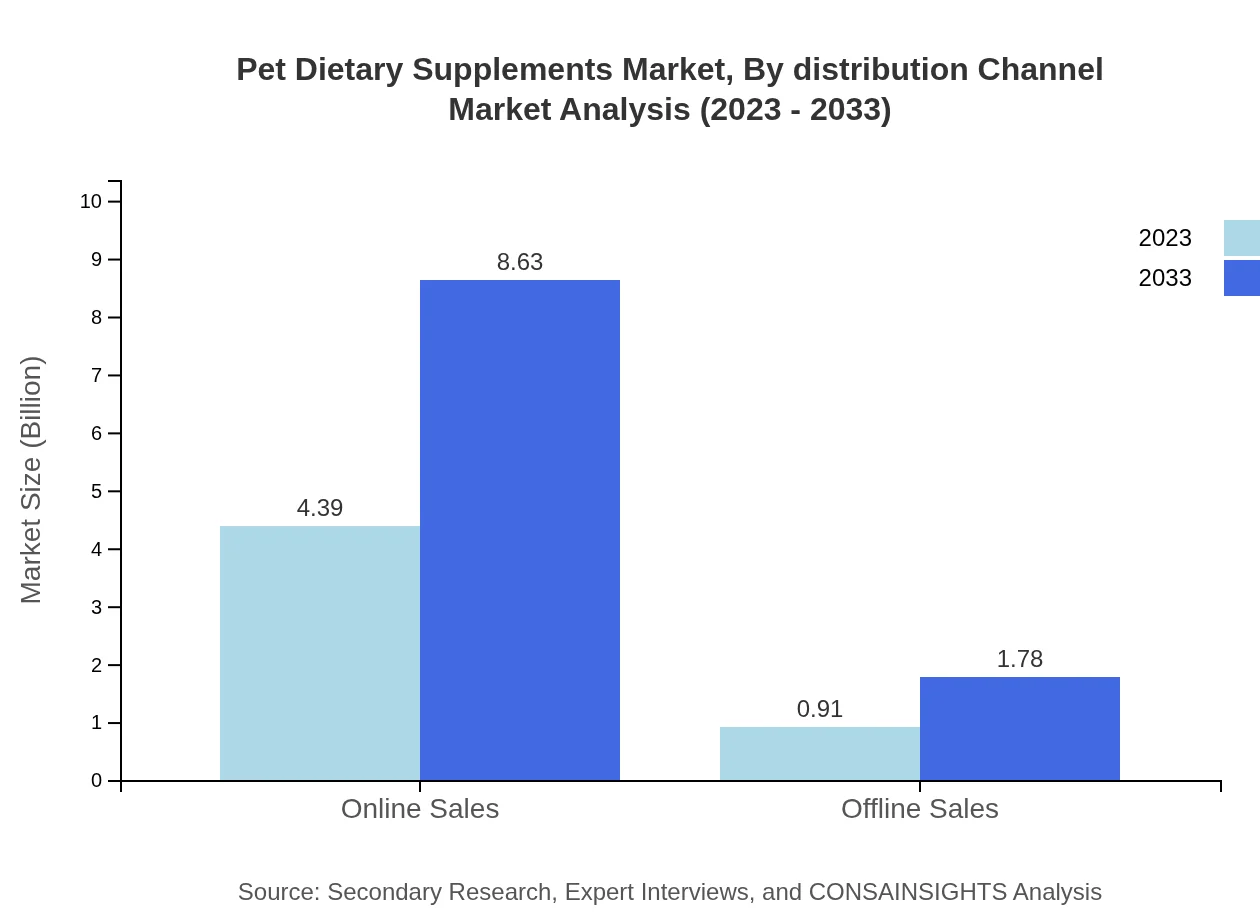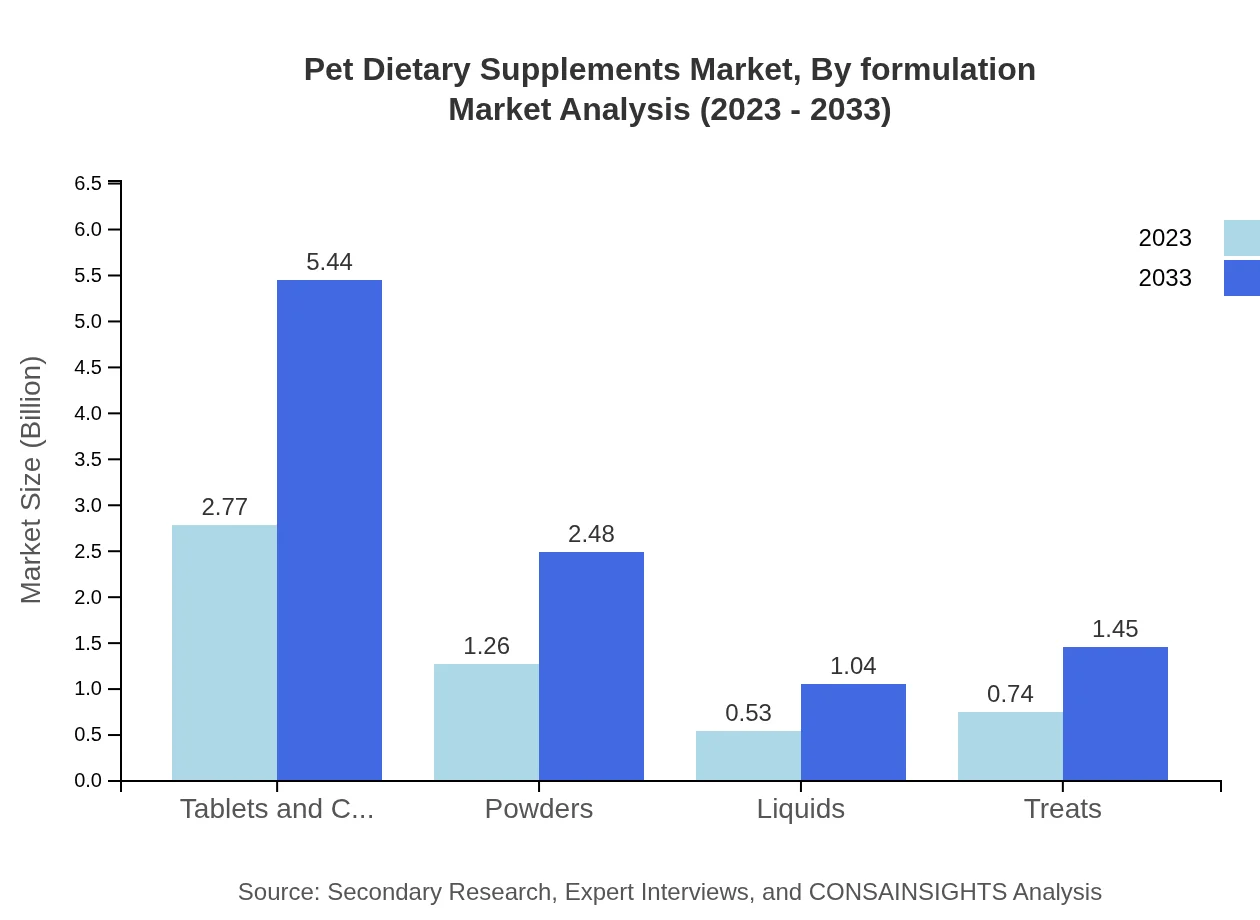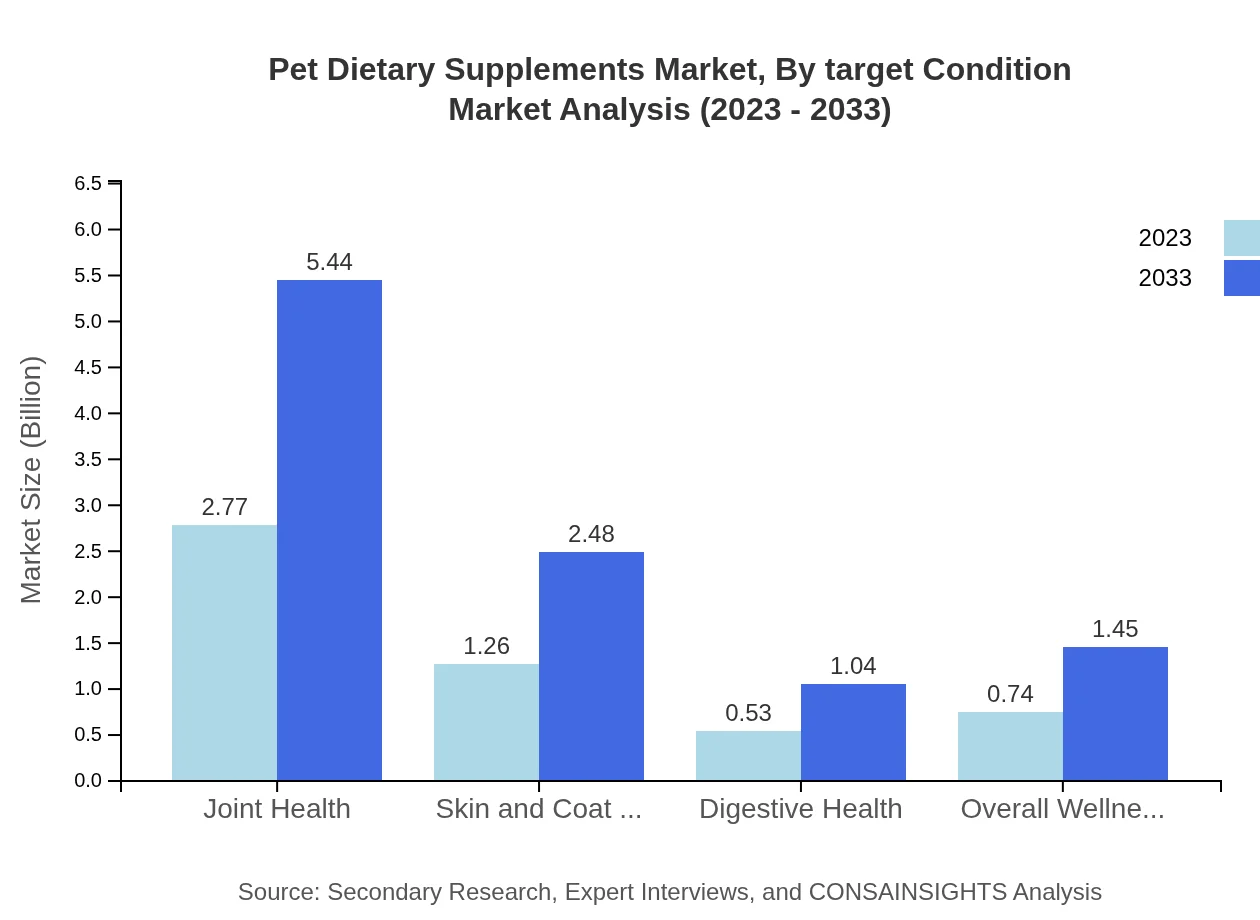Pet Dietary Supplements Market Report
Published Date: 31 January 2026 | Report Code: pet-dietary-supplements
Pet Dietary Supplements Market Size, Share, Industry Trends and Forecast to 2033
This report provides a comprehensive analysis of the Pet Dietary Supplements market, focusing on insights, trends, and forecasts from 2023 to 2033. It encompasses market size, segmentation, industry analysis, and regional assessments to deliver valuable data for stakeholders.
| Metric | Value |
|---|---|
| Study Period | 2023 - 2033 |
| 2023 Market Size | $5.30 Billion |
| CAGR (2023-2033) | 6.8% |
| 2033 Market Size | $10.42 Billion |
| Top Companies | Nestlé Purina PetCare, Hill's Pet Nutrition, Bayer Animal Health, Zesty Paws |
| Last Modified Date | 31 January 2026 |
Pet Dietary Supplements Market Overview
Customize Pet Dietary Supplements Market Report market research report
- ✔ Get in-depth analysis of Pet Dietary Supplements market size, growth, and forecasts.
- ✔ Understand Pet Dietary Supplements's regional dynamics and industry-specific trends.
- ✔ Identify potential applications, end-user demand, and growth segments in Pet Dietary Supplements
What is the Market Size & CAGR of Pet Dietary Supplements market in 2023?
Pet Dietary Supplements Industry Analysis
Pet Dietary Supplements Market Segmentation and Scope
Tell us your focus area and get a customized research report.
Pet Dietary Supplements Market Analysis Report by Region
Europe Pet Dietary Supplements Market Report:
The European market is anticipated to increase from $1.43 billion in 2023 to $2.81 billion by 2033. European consumers showcase a preference for quality and sustainability, with premium products also gaining traction. Health-conscious Europeans are pushing the market to innovate by offering supplements that meet their ecological and health standards.Asia Pacific Pet Dietary Supplements Market Report:
In the Asia Pacific region, the Pet Dietary Supplements market is forecasted to grow from $1.12 billion in 2023 to $2.21 billion in 2033. Key drivers include rising disposable incomes, an increase in pet ownership, and growing awareness of pet health. The region is witnessing an increase in demand for premium and specialized dietary supplements, reflecting heightened consumer interest in pet well-being.North America Pet Dietary Supplements Market Report:
North America dominates the Pet Dietary Supplements market, projected to expand from $1.80 billion in 2023 to $3.54 billion in 2033. Major factors contributing to this growth include high pet ownership rates, the trend toward preventive healthcare, and a significant rise in spending on pet health and wellness products. The increasing popularity of online shopping has further bolstered growth.South America Pet Dietary Supplements Market Report:
The South American market, while smaller, is expected to see growth from $0.22 billion in 2023 to $0.43 billion in 2033. Emerging trends indicate a growing market for natural and organic supplements, driven by consumers becoming more health-conscious regarding their pets. Increased marketing by companies is also helping educate pet owners.Middle East & Africa Pet Dietary Supplements Market Report:
In the Middle East and Africa, the market size is projected to grow from $0.73 billion in 2023 to $1.43 billion in 2033. Rising disposable incomes, urbanization, and growing awareness about pet health are key contributors to the growth in this region, as is the burgeoning pet ownership culture.Tell us your focus area and get a customized research report.
Pet Dietary Supplements Market Analysis By Product Type
The Pet Dietary Supplements market is primarily segmented into various product types, including Vitamins and Minerals, Probiotics, Omega Fatty Acids, and Herbal Supplements. Vitamins and Minerals hold a significant share of the market due to their essential role in pet health, projected to grow from $2.77 billion in 2023 to $5.44 billion in 2033. Probiotics are also increasingly popular, expected to grow from $1.26 billion to $2.48 billion in the same period. Herbal supplements are gaining traction too, showcasing a shift towards natural remedies.
Pet Dietary Supplements Market Analysis By Animal Type
The market is majorly segmented by animal type, focusing on Dogs, Cats, and Other Pets. The Dogs segment leads with a market size of $3.22 billion in 2023 and projected growth to $6.34 billion by 2033, showing a consistent stronghold throughout the forecast period. Cats account for a market size of $1.07 billion, expanding to $2.10 billion, while Other Pets represent growth potential, increasing from $1.00 billion to $1.98 billion.
Pet Dietary Supplements Market Analysis By Distribution Channel
Distribution channels for Pet Dietary Supplements include Online and Offline Sales. Online sales are predominant, with market sizes growing from $4.39 billion in 2023 to $8.63 billion in 2033 due to the ease of access and demand for convenience. Offline sales are expected to grow modestly from $0.91 billion to $1.78 billion as traditional retail stores continue to hold significance for certain consumer segments.
Pet Dietary Supplements Market Analysis By Formulation
The Pet Dietary Supplements market can be segmented by formulation into Tablets and Capsules, Powders, Liquids, and Treats. Tablets and Capsules dominate the market with expected growth from $2.77 billion to $5.44 billion by 2033. Powders follow, growing from $1.26 billion to $2.48 billion, while Liquids and Treats also hold market shares, indicating the preference for varied product deliveries.
Pet Dietary Supplements Market Analysis By Target Condition
Target conditions for Pet Dietary Supplements include Joint Health, Digestive Health, Skin and Coat Health, Overall Wellness, and more. Joint Health dominates with a significant share, projected to grow from $2.77 billion to $5.44 billion by 2033. Digestive Health also shows strong growth, with an increase from $0.53 billion in 2023 to $1.04 billion in 2033.
Pet Dietary Supplements Market Trends and Future Forecast
Tell us your focus area and get a customized research report.
Global Market Leaders and Top Companies in Pet Dietary Supplements Industry
Nestlé Purina PetCare:
Nestlé Purina PetCare is a prominent player in the pet dietary supplements market, known for its strong commitment to pet health through innovative nutritional products and a range of popular brands focused on overall wellness.Hill's Pet Nutrition:
Hill's Pet Nutrition specializes in scientifically formulated foods and supplements, emphasizing health benefits tailored to pets' unique nutritional needs, establishing itself as a leader in this market segment.Bayer Animal Health:
Bayer Animal Health is recognized for its diverse health products for pets, contributing significantly to the dietary supplements sector with its focus on preventive care and wellness solutions.Zesty Paws:
Zesty Paws is a growing brand that provides functional supplements targeting specific health needs, gaining popularity due to its emphasis on quality ingredients and customer satisfaction.We're grateful to work with incredible clients.









FAQs
What is the market size of pet Dietary Supplements?
The market size for pet dietary supplements is projected to reach approximately $5.3 billion in 2023, with a compound annual growth rate (CAGR) of 6.8% expected through 2033. This growth indicates a robust demand for health-focused products in the pet industry.
What are the key market players or companies in this pet Dietary Supplements industry?
Key players in the pet dietary supplements market include well-known companies that specialize in pet care products. Their innovative solutions and strategic partnerships drive market competition, enhancing product offerings and expanding distribution channels to meet consumer demands.
What are the primary factors driving the growth in the pet Dietary Supplements industry?
Growth in the pet dietary supplements industry is largely driven by increasing pet ownership, rising awareness about pet health, and a growing trend towards natural and organic products. Furthermore, evolving veterinary recommendations and consumer preferences are pivotal in fueling this growth.
Which region is the fastest Growing in the pet Dietary Supplements?
The fastest-growing region for pet dietary supplements is North America, with the market expected to grow from $1.80 billion in 2023 to $3.54 billion by 2033. Europe and Asia Pacific also demonstrate significant growth potential, reflecting increasing pet health awareness.
Does ConsaInsights provide customized market report data for the pet Dietary Supplements industry?
Yes, ConsaInsights offers customized market reports tailored to the pet dietary supplements industry. This includes in-depth analysis on market trends, consumer behaviors, and strategic insights that align with specific business needs.
What deliverables can I expect from this pet Dietary Supplements market research project?
Deliverables from this market research project may include a comprehensive market analysis report, trends forecasts, competitive landscape insights, and detailed segmentation data, empowering decision-making and strategic planning for stakeholders in the pet dietary supplements sector.
What are the market trends of pet dietary supplements?
Key market trends in pet dietary supplements include increased focus on natural ingredients, growth in online sales channels, and higher demand for specific health solutions such as joint health and overall wellness products for pets.

